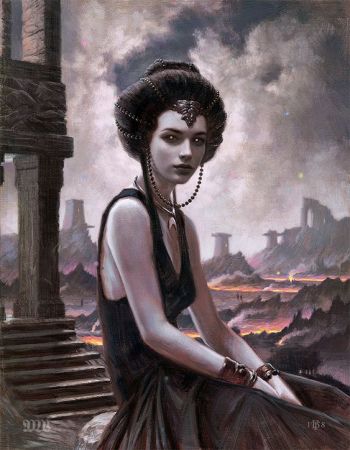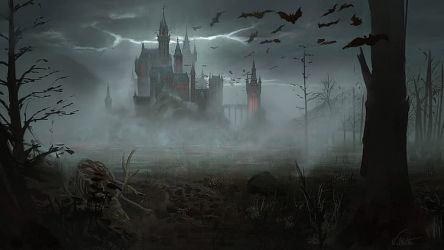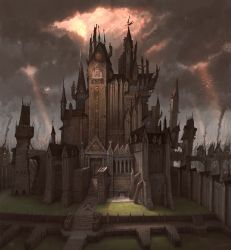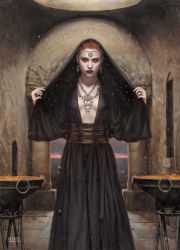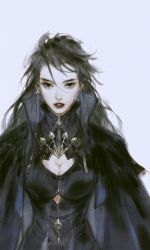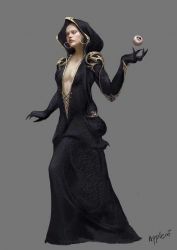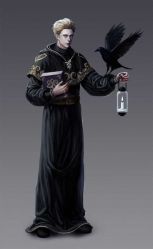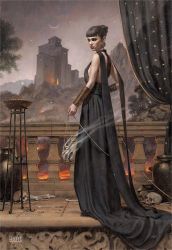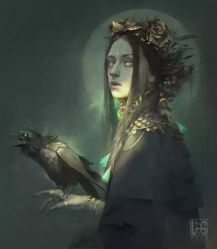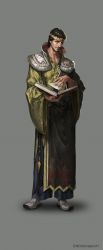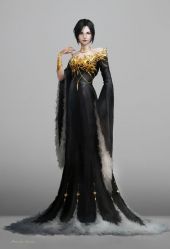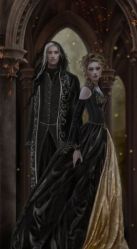Changes: Sim Layout, City-States, RPCSS Factions, and Storyline. Read More
Difference between revisions of "Fendahl"
From The Citadel
| Line 18: | Line 18: | ||
; Traditions | ; Traditions | ||
| − | The Fenrii worship a blindfolded triple-faced goddess who is called upon for all aspects of witchcraft, magic, the Moon, doorways, and creatures of the night such as hell-hounds and ghosts. Celeste is often depicted carrying a torch and three faces, representing her role as the guardian of crossroads. Celeste is both beloved and feared. Her worship | + | The Fenrii worship a blindfolded triple-faced goddess who is called upon for all aspects of witchcraft, magic, the Moon, doorways, and creatures of the night such as hell-hounds and ghosts. Celeste is often depicted carrying a torch and three faces, representing her role as the guardian of crossroads. Celeste is both beloved and feared. Her worship is reserved for weekly devotions and is primarily liturgical and ritualistic. |
Day to day practices, on the other hand, revolve around one's ancestors as well as the seven lucky gods. These gods have no names, but actively infuse daily life, as the Fenrii hope to ward of bad luck. Their aspects cover business, food abundance, demon hunting, war, the arts, the elderly, and popularity. Small figurines of the seven gods both together and separately can be found all over Fendahl; street shrines, home shrines, offering tables in businesses, etc. | Day to day practices, on the other hand, revolve around one's ancestors as well as the seven lucky gods. These gods have no names, but actively infuse daily life, as the Fenrii hope to ward of bad luck. Their aspects cover business, food abundance, demon hunting, war, the arts, the elderly, and popularity. Small figurines of the seven gods both together and separately can be found all over Fendahl; street shrines, home shrines, offering tables in businesses, etc. | ||
Revision as of 20:22, 25 December 2020
Fenrii of Comraich, the Adams Family, Nightmare before Christmas, and every cheerfully dark lore to be imagined.
- Where is the city located geographically.
- What is the architecture like
- How do they gather food
- Personality
The Fenrii are a people cursed. They truly believe that they may be struck by a curse at any point in their life and become a danger to themselves or their family. Consequently, they are particularly superstitious and practice all manner of folk medicine to ward off evil spirits. In truth, while few Fenrii actually suffers from obscure ailments, they seem to have an inordinate number of rare conditions popping up in their citizenship. Hypertrichosis, Albinism, Clinical lycanthropy, Porphyria, and Leprosy show up at least every other generation in a person's extended family -- everyone has at least one unfortunate Uncle Boris or Aunt Shishi.
The Fenrii organize themselves along Ducal family lines much in the way of the Halsteins though they do not use the formalized "von" at the end of their name unless they are actual members of the Aristocracy. This leads scholars to believe that there was an infusion of early Halstein exiles, alongside the Asian influence of Khonzhou. Unfortunately, the Fenrii are not pure enough to find common ground with either city-state and are more likely to ally with either Telrae'dor or Tenysia. Curiously enough, the Rus people find the Fenrii to be "pleasant and sober companions". Or perhaps they simply appreciate a captive audience for their own dour predictions.
Fendahl has a prince or princess, never a king or queen, as their ancient lore says that the true king and queen will rise from the dead to rule. However, the prince and princess are always treated like royalty and their word governs the politics of the people.
- Appearance
The Fenrii are traditionally pale skinned with thick black hair, even if they must dye it for it to be black. They are typically fine-featured with caucasian noses, slanted eyes and pointed chins. Yet, like Tenysia, Fendahl is home to many immigrants who were exiled from their own cities, but with enough goods or coin to earn a position within the city limits. Consequently, it's not uncommon to see all manner of people in the traditional black favored by the aristocracy.
When one asks a servant to bring one their last season's ball gown, the servant never asks what color it is ... Black, grey, white, and ash shades of lavender and rose are the traditional colors of Fendahl, for one is most certainly always in mourning, preparing to go into mourning, or just practicing what it will be like. Within this curiously restricted color wheel, the Fenrii have found a way to make every outfit interesting and eye-catching -- and all manner of hats, hairstyles, trinkets, tassels, walking sticks, and cloaks are embraced and displayed.
- Traditions
The Fenrii worship a blindfolded triple-faced goddess who is called upon for all aspects of witchcraft, magic, the Moon, doorways, and creatures of the night such as hell-hounds and ghosts. Celeste is often depicted carrying a torch and three faces, representing her role as the guardian of crossroads. Celeste is both beloved and feared. Her worship is reserved for weekly devotions and is primarily liturgical and ritualistic.
Day to day practices, on the other hand, revolve around one's ancestors as well as the seven lucky gods. These gods have no names, but actively infuse daily life, as the Fenrii hope to ward of bad luck. Their aspects cover business, food abundance, demon hunting, war, the arts, the elderly, and popularity. Small figurines of the seven gods both together and separately can be found all over Fendahl; street shrines, home shrines, offering tables in businesses, etc.
Like the Sythians the Fenrii bury their people in above-ground crypts, but they do not embalm their dead, instead, they are laid to rest with little additional preparation other than bathing and nice clothes. "Accidental" premature burials are not uncommon, and coffin-holes are widely used - just in case.
- Expanded Lore
- Further reading and links for the culture obsessed.
Small Council NPCs
Phrases
Gallery
- Needs some more men not in robes
